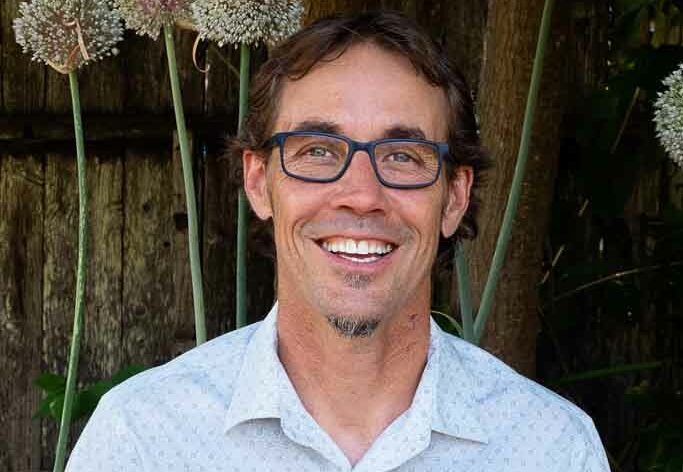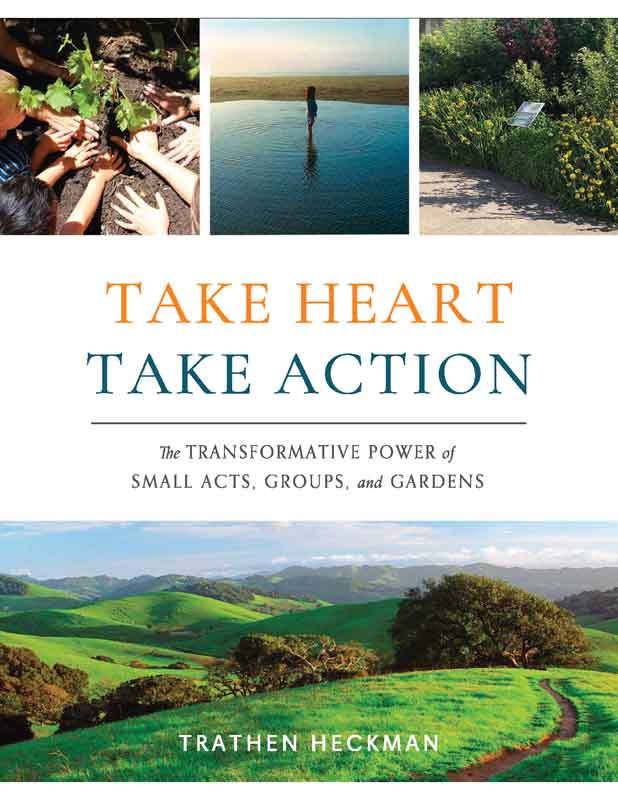For those of us in Northern California, some days it seems the world is going to hell in an organic, fair trade, artisanally-woven handbasket. But that doesn’t mean it can’t be fixed.
Here’s a thought: Our accumulated, collective actions are meaningful on both a micro and macro scale. This has been the driving premise of Daily Acts, a holistic education nonprofit that helps enable “transformative actions that create connected, equitable and climate resilient communities.”
The driving force behind Daily Acts since its inception over 20 years ago is Trathen Heckman, who recently collected what he has learned shepherding moments into movements in Take Heart, Take Action: The Transformative Power of Small Acts, Groups and Gardens.
Heckman is a charismatic and passionate presence with a mind clearly firing on all cylinders. That said, he deliberately keeps his message human scale. He doesn’t present a single path so much as a process that makes any pathway both imaginable and navigable. It’s this ability that has made him a sought after speaker at such conferences as Bioneers and such a beguiling interview for jaded journos.
What follows is a transcript of a recent conversation (edited for length) that we shared in his Petaluma backyard, atop a sculpted cob bench, surrounded by a living symphony of greenery.
Trathen Heckman: Our core focus is helping people reclaim the power of their daily actions, helping people, groups and communities to unleash the power of community and address the climate crisis and sustainability inequities, all these big issues we’re facing. And you know the problem is if you look at the news, you could just get overwhelmed. There’s just bad news everywhere. And it feels like everything’s so big, it’s beyond our power to influence. And so the core message in Daily Acts and in the book is the transformative power of “small.”
Daedalus Howell: And the power of the individual too.
TH: Yeah, when you find the spot where your heart’s inspiration meets the hurt that you’re called to heal and you’re ineffective to try and do it all, and so you focus on the power of your daily actions. You focus on what is in your circle of influence. And when you focus on the things you can influence that are tied with your inspiration, that are tied with issues you care about, that are tied to your values, you increase your power to affect positive change.
DH: You can actually see the influence you’ve made.
TH: Exactly. And it’s self-regenerative. And then when you find other like hearts and like minds, that’s Margaret Mead’s quote, “Never doubt the ability of a small group of people to change the world. That’s all that it’s ever been,” you start to see. So as much as there’s all these big problems and we can’t solve the problems, we’re faced with individual action. It has to be collective action. It has to be policy change; it has to be bigger systemic change. But the only power any one of us has is our small daily actions. You’re one human, and so that’s all the power you have. But when you combine your passions and interests and concerns tied to a bigger cause and you get with other people in small groups, like small groups could have a massively enormous effect.
DH: And that’s the message of Daily Acts.
Take Heart Take Action
TH: We started out focusing on educating people about sustainability and permaculture gardens. Rather than complaining about what’s going on, we said, “Look, this gray water system helped change city, county and state policy. This is an ecological landscape that’s growing a huge amount of food. It’s harvesting rain, it’s creating habitat, it’s sequestering carbon dioxide emissions out of the air while building healthy soil.” We show the practical, tangible examples.
DH: And you also collect the data, and you go back and you’re able to say to policy makers, “Here are some facts to consider where we are able to manifest this; what if you put some rocket fuel into this,” so to speak.
TH: At scale. We have a friend of ours, he has an award-winning, local sustainability landscape business. He ran the carbon sequestration numbers on the Kavanaugh Center garden we did. That’s the first public food forest we installed 12 years ago. At that time, cities were trying to save a lot of water, but they’re doing it by ripping up lawn and it goes to the landfill. And so you’re literally taking out what it took nature 500 to 1,000 years to grow, and then it can’t be compost because it’s so dense. It goes to the landfill and then it adds to all these greenhouse gas emissions. So like, “No, no, no.” Let’s save water, but let’s address rain as well. Harvest the rain in the landscape; let’s grow food, medicine, habitat, beauty; let’s have community come and get educated and involved.
DH: And the data?
TH: So, he ran the carbon numbers on the difference between that and a normal landscape. And it’s really significant. It’s a lot of carbon savings that’s getting sequestered into food, medicine, habitat, beauty. And so you take that one little landscape—a next number we want to do, we’ve been talking with the city about—well what if we transformed all or even half of the median strips and the small public spaces and the gardens; it’s a big number. One inch of rain on our roof is like 600 gallons of water. An inch of rain on this property is 4,000 gallons of water. An inch of rain on the city of Petaluma, 240 million gallons of water.
DH: That’s incredible. How do you galvanize people into action from there?
TH: We started doing education, showing people what’s possible. Then we started teaching people, “Here’s how you build a cob bench. Here’s how you do a gray water system. Here’s how you do a rainwater system.” And then that morphed into going like, “Okay, well we need to start transforming landscapes with community members.” That’s when we did Kavanaugh Center [in Petaluma], and we partnered to transform the Petaluma City Hall. And then that led into doing all of which is captioned in the book, that led into doing action campaigns and going from one garden to 100s of gardens to tens of thousands of actions in projects.
DH: That’s great, but how do we stay sustained?
TH: It’s so difficult out there. There is “activist burnout.” They’re like, “It’s enough to take care of family and try to figure out my job.” And they kind of don’t want to wade in because it seems so overwhelming. That was a bit of the genesis of writing the book, of sharing our story and our work to help other people, groups and communities do it.
DH: And in a way that’s demonstrative, so readers can replicate a model or at least employ the Daily Acts philosophy in their own way.
TH: And that’s really important too, because it’s not as easy to go, “Oh, just go replicate doing 1,000 gardens like Daily Acts did.” It comes down to like, “Well, what’s our culture and what’s our operating system that enables us to solve problems and come up with solutions the way we do?” …You start small and build. Yeah, you start with yourself. You start with your own garden, then a small public garden, then a bigger one, then a bigger one, then lots of bigger ones.
To support the release of ‘Take Heart, Take Action: The Transformative Power of Small Acts, Groups and Gardens,’ visit crowdfundr.com/takehearttakeaction or visit dailyacts.org.







